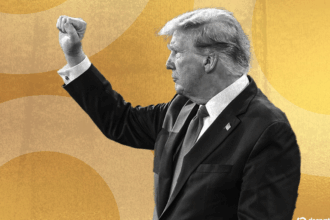PayPal Co-Founder Launches New Bank to Replace Silicon Valley Bank
Report: Erebor targets AI, crypto, defense firms, files for charter
In Brief
- PayPal co-founder Peter Thiel and other tech billionaires are banding together to establish Erebor bank.
- Erebor aims to fill the void left by the collapsed crypto-linked Silicon Valley Bank, serving AI, crypto, manufacturing, and defense technology companies.
- The bank has filed for a national charter with the Office of the Comptroller of the Currency (OCC).
The Financial Times reported Monday, citing sources familiar with the matter, that PayPal co-founder Peter Thiel and several other technology billionaires are launching a financial institution called Erebor designed to replace Silicon Valley Bank (SVB).
The initiative is led by defense technology firm Anduril co-founder Palmer Luckey, with support from Palantir co-founder Joe Lonsdale and Thiel’s Founder Fund. Erebor has formally filed for a national bank charter with the Office of the Comptroller of the Currency (OCC), a federal banking regulator.
Promisingly positioned like SVB, Erebor targets venture capital-backed startups typically excluded by traditional financial institutions—particularly in the technology sectors of artificial intelligence, defense, manufacturing, and cryptocurrencies. Its stated goals mirror those of SVB but seek to avoid its fate.
SVB, which served a diverse range of crypto companies including BlockFi, Circle, and Avalanche along with venture-backed startups, collapsed in March 2023. Its implosion stemmed from “outsized investment in low-yield bonds and other financial missteps that rendered it unable to hold up in a bank run initiated by its tech-heavy clientele.”
Erebor’s leadership includes co-CEOs Owen Rapaport, co-founder of software firm Argus, and Jacob Hirshman, a former Circle adviser. The bank intends to add stablecoins to its balance sheet, though specific dollar-pegged tokens remain unspecified.
Legacy of SVB
SVB’s strategic position hosting crypto firms made its collapse particularly impactful. Erebor explicitly targets a similar niche, highlighting the ongoing need for specialized banking services within the venture-backed tech ecosystem.
Timing and Context
Erebor’s launch coincides with a resurgence in the digital assets landscape under U.S. President Donald Trump, who maintains close ties with the industry. The Digital Asset and Token Economic Growth Act (DAETE Act), sometimes called the “Genius Act,” recently passed by the Senate provides a regulatory framework for stablecoins—a significant boost for the crypto industry. Adding to this momentum, market structure legislation expected to become law later this year aims to facilitate easier operations for crypto companies in the United States.
This favorable environment has already stimulated activity: Bitcoin, often used as a market gauge, reached two “all-time highs” several months after Trump’s inauguration, fueling an “uptick in mergers-and-acquisition activity across the industry as well as a crypto IPO boom.”












